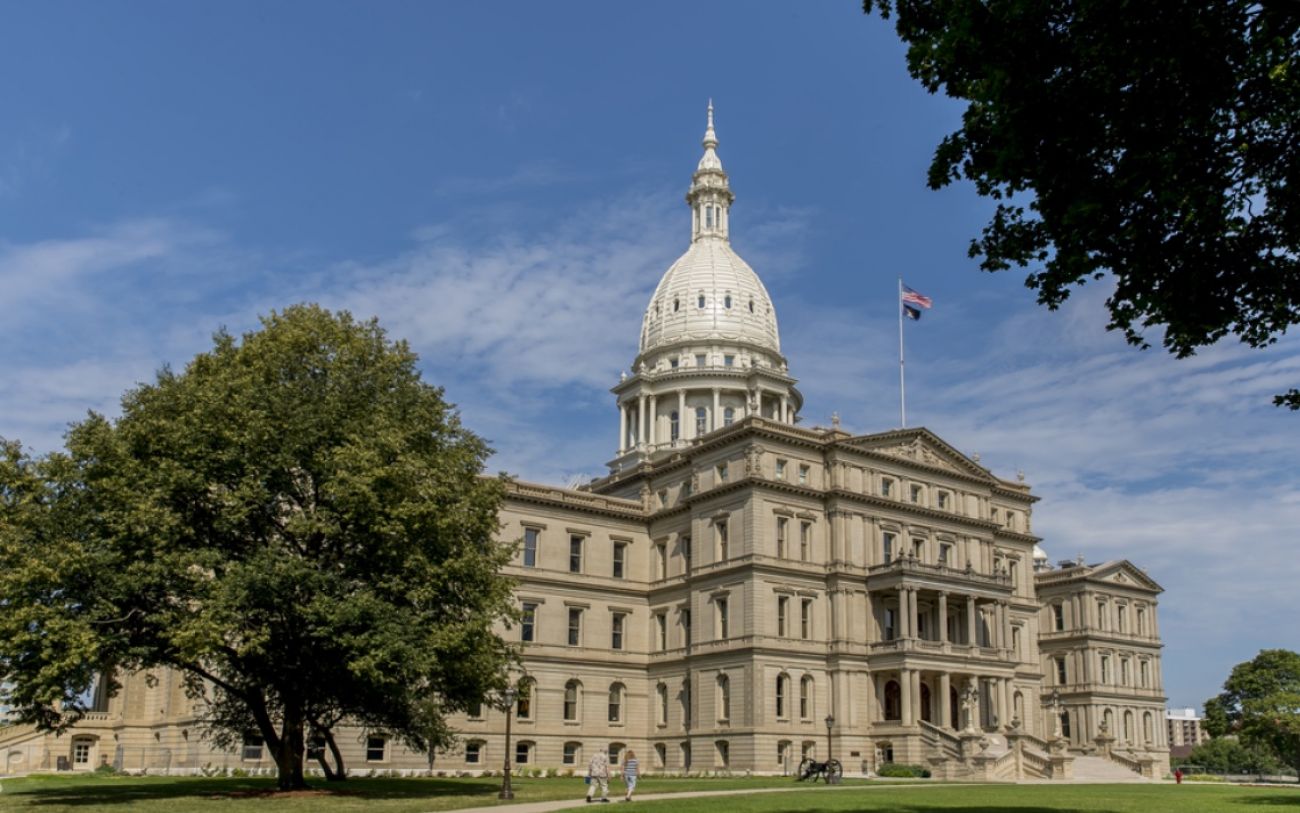Michigan GOP asks high court to rule on sick leave, minimum wage changes

July 17: Michigan Supreme Court hears debate on minimum wage, sick leave laws
Update: Michigan minimum wage, paid sick leave case to get Supreme Court review
State lawmakers from both parties say they’re confident they’re on the right side of a debate about whether it was legal to adopt and change two citizen-backed laws to raise Michigan’s minimum wage and require employer-sponsored paid sick leave last year.
They can’t both be right.
So the Legislature is moving forward with a plan to ask the Michigan Supreme Court to bring clarity to a controversy that has perplexed business groups and ballot committees on opposing sides of the issues.
A pair of legislative resolutions, adopted Wednesday without debate in both the House and Senate, direct the Legislature to ask the Supreme Court to provide an opinion that answers two key questions underlining the debate:
- Is it legal under the state constitution for the Legislature to adopt citizen initiatives and later revise them in the same two-year term?
- Are the Legislature’s reworked versions of the minimum wage and paid sick leave laws legal?
State lawmakers could have their request to the state’s high court as soon as this week, using a constitutional provision that gives them the right to ask for a court opinion before a law takes effect.
“This is a question of constitutionality, and we believe strongly that we acted within our constitutional authority as a Legislature,” said state Rep. Triston Cole, R-Mancelona, who introduced the House resolution Tuesday.
But the request is not a slam dunk — the Supreme Court does not have to respond, and has done so on rare occasions in the past. The last time the court granted a request was eight years ago, in response to then-Gov. Rick Snyder.
“They may choose not to take it up altogether, which puts us right back where we are today. So there's no harm, no foul,” Senate Majority Leader Mike Shirkey, R-Clarklake, told reporters Wednesday after the Senate adopted its resolution.
“This is just an attempt, sincerely, to remove the uncertainty, the cloud, over the state over these two issues and allow our job makers and workers some certainty about what's going to happen.”
The resolutions — sponsored in both chambers by Republicans — weren’t met with much resistance. Last year, Democrats criticized the GOP-majority Legislature for adopting proposals written by ballot committees that gathered hundreds of thousands of voters’ signatures in support, only to gut the strongest provisions in lame-duck session, when many lawmakers were nearing the end of their term limits.
“I welcome that decision by the Supreme Court,” said House Democratic Leader Christine Greig of Farmington Hills, after a House committee hearing on the resolution.
She said she supports a simple request and is concerned that Republicans in the majority might try to use taxpayer dollars to later defend their position in court, adding: “The very goal of a citizens’ petition is to bring the citizens’ will to it.”
The Legislature last fall adopted citizen-initiated proposals to raise Michigan’s minimum wage to $12 an hour by 2022 and require employers to offer 72 hours of paid sick leave, and later revised them before the two-year legislative term ended in December.
The strongest provisions were weakened so that Michigan’s minimum wage now will reach $12.05 by 2030, and employers are required to offer 40 hours of sick leave, while exempting businesses with fewer than 50 employees from the sick leave law.
Republicans and business groups argued the laws as written by advocates working to get them on the November ballot were too burdensome. Snyder, who signed the Legislature’s revisions into law in December, said at the time the citizen-backed proposals were well-meaning, but would have harmed the state’s economic recovery.
Business owners are in limbo because of the legal questions that hover over the laws, said Charlie Owens, state director of the National Federation of Independent Business in Michigan. The minimum wage and sick leave laws take effect March 29.
Owens said businesses are proceeding as if the laws as revised by the Legislature will stand. But he said his group and others won’t spend a lot of time providing training to members on laws that may be deemed unconstitutional.
“What's important is that (the court rules), because this ping-ponging back and forth on this issue has to end,” he told Bridge after a House committee hearing Wednesday.
That uncertainty extends to the ballot initiative process, backers of the original minimum wage and sick leave proposals said.

“We believe the scheme to adopt and amend earned paid sick time was a clear violation of Michigan's Constitution,” Danielle Atkinson, co-chairwoman of the MI Time to Care ballot committee that wrote the paid sick leave law, said in a statement Tuesday. “We are confident that the law is on the side of the people who have the right to use the ballot to enact popular proposals such as earned paid sick time.”
Alicia Renee Farris, state director of the Restaurant Opportunities Center of Michigan and a chairwoman of the Michigan One Fair Wage steering committee, issued a statement late Tuesday that read:
“Gutting the One Fair Wage proposal during lame duck was an unconstitutional move that tramples democracy and undermines the rule of law. We are confident the rule of law will be upheld and the voices of the 400,000 Michiganders who supported the One Fair Wage proposal will be heard.”
The Legislature’s request of the Supreme Court sidesteps the traditional litigation process. Advisory opinions sought by the Legislature or the governor under the state constitution aren’t precedent the same way a ruling in a lawsuit would be. That means it’s possible that a lawsuit still could be filed to challenge these laws.
New Democratic Attorney General Dana Nessel already has been asked to weigh in, a request her office said she is considering. Nessel’s opinion, should she issue one, likely would supersede an opinion late last year from then-Republican Attorney General Bill Schuette, who said nothing in the state constitution prevents the Legislature from adopting and amending citizen initiatives in the same term.
Schuette’s opinion itself superseded a 1964 opinion from former Democratic Attorney General Frank Kelley, who said the opposite. Kelley’s opinion is preferred by state Sen. Stephanie Chang, D-Detroit, and other supporters of the citizen proposals.
“Residents have the right to know what their rights are in terms of the citizen-initiated petition process,” Chang told reporters Wednesday.
She declined to disclose how she voted on the resolution, which was done by a vote of “aye” or “nay,” rather than by a roll call of senators.
“Regardless of what happens and who weighs in, it seems that there is going to be a process where we will get some clarity,” she said. “My hope is that it starts with the attorney general's opinion.”
Shirkey countered that regardless of what path is taken, one side in the debate is going to be unhappy and likely will appeal to a court to decide. The Legislature’s request for an opinion, he said, is a way to expedite the process.
“Why leave the state in the condition of uncertainty?” he said. “Let's just take it all the way to the Supreme Court, which is within our prerogative to do so, and get it taken care of as soon as possible. I have no clue how the Supreme Court will rule. All I know is it's going to get there eventually, so why wait?”
Read more coverage:
- Dec. 14: Snyder signs bills that weaken Michigan minimum wage, sick leave laws
- Dec. 4: Opinion | Gutting paid sick leave disrespects voters, undermines democracy
- Dec. 3: Group behind Michigan paid sick leave vows 2020 ballot drive if law gutted
- Nov. 27: Michigan Republicans aim to soften minimum wage, sick leave in lame duck
- Oct. 31: Opinion | Healthy workers will keep the Michigan economy growing
- Oct. 18: Servers want $12 an hour. This restaurant owner says he can't afford it.
- Oct. 18: Paid sick leave law making some Michigan businesses feel queasy
See what new members are saying about why they donated to Bridge Michigan:
- “In order for this information to be accurate and unbiased it must be underwritten by its readers, not by special interests.” - Larry S.
- “Not many other media sources report on the topics Bridge does.” - Susan B.
- “Your journalism is outstanding and rare these days.” - Mark S.
If you want to ensure the future of nonpartisan, nonprofit Michigan journalism, please become a member today. You, too, will be asked why you donated and maybe we'll feature your quote next time!




